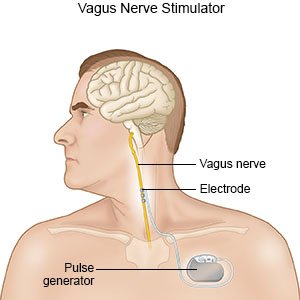Vagus Nerve Stimulation
Medically reviewed by Drugs.com. Last updated on Apr 6, 2025.
VNS is a treatment used for epilepsy and depression. VNS is used when medicines and other treatments have not worked well. VNS may help shorten the recovery time after you have a seizure. VNS may also help decrease symptoms of depression. It may take several months to notice changes in your seizure or depression symptoms.
 |
DISCHARGE INSTRUCTIONS:
Call your doctor or surgeon if:
- Your surgery area has healed but you are having pain at the pulse generator site.
- You have a fever.
- Your surgery area is red, swollen, or has pus coming from it.
- Your symptoms return or get worse.
- You have new pain or new symptoms with stimulation.
- You feel like you are being shocked with the stimulator on or off.
- You have questions or concerns about your condition or care.
Drugs used to treat this and similar conditions
Keppra
Keppra is an anti-epileptic drug used to treat partial onset seizures in people with epilepsy ...
Onfi
Onfi (clobazam) is used to treat seizures associated with Lennox-Gastaut syndrome, a form of ...
Omvoh
Omvoh is used to treat moderate to severe ulcerative colitis or Crohn's disease in adults. This ...
Ativan
Ativan is a benzodiazepine used to treat anxiety disorders or anxiety associated with depression ...
Banzel
Banzel (rufinamide) is used in combination with other medications to treat adults and children with ...
Epidiolex
Epidiolex (cannabidiol) is an oral prescription liquid CBD medicine that may be used to treat ...
Xcopri
Xcopri (cenobamate) is an oral, once-daily, tablet that may be used to treat partial-onset seizures ...
Vimpat
Vimpat is used to treat partial onset seizures and primary generalized tonic-clonic seizures in ...
Medicines:
You may need any of the following:
- Antibiotics help prevent a bacterial infection.
- Prescription pain medicine may be given. Ask your healthcare provider how to take this medicine safely. Some prescription pain medicines contain acetaminophen. Do not take other medicines that contain acetaminophen without talking to your healthcare provider. Too much acetaminophen may cause liver damage. Prescription pain medicine may cause constipation. Ask your healthcare provider how to prevent or treat constipation.
- NSAIDs , such as ibuprofen, help decrease swelling, pain, and fever. NSAIDs can cause stomach bleeding or kidney problems in certain people. If you take blood thinner medicine, always ask your healthcare provider if NSAIDs are safe for you. Always read the medicine label and follow directions.
- Take your medicine as directed. Contact your healthcare provider if you think your medicine is not helping or if you have side effects. Tell your provider if you are allergic to any medicine. Keep a list of the medicines, vitamins, and herbs you take. Include the amounts, and when and why you take them. Bring the list or the pill bottles to follow-up visits. Carry your medicine list with you in case of an emergency.
Self-care:
- Ask your surgeon about daily activities. You may need to limit activity until your surgery area heals.
- Care for your surgery area as directed. Carefully wash the area with soap and water. Gently pat the area dry.
- Keep the magnet or other programming device with you at all times.
- Tell other providers that you have an implanted VNS device. This is so other treatments or testing (such as MRI) do not interfere with the device.
Follow up with your doctor or surgeon as directed:
You will need regular visits to make sure the device is working correctly. Healthcare providers will also check the position of the device and wire. Ask about medical tests, such as an MRI. The metal used in an MRI may interfere with the device. Write down your questions so you remember to ask them during your visits.
© Copyright Merative 2025 Information is for End User's use only and may not be sold, redistributed or otherwise used for commercial purposes.
The above information is an educational aid only. It is not intended as medical advice for individual conditions or treatments. Talk to your doctor, nurse or pharmacist before following any medical regimen to see if it is safe and effective for you.
Further information
Always consult your healthcare provider to ensure the information displayed on this page applies to your personal circumstances.
